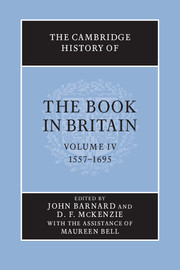Book contents
- Frontmatter
- Dedication
- Contents
- List of illustrations
- List of contributors
- Preface
- Acknowledgements
- Introduction
- RELIGION AND POLITICS
- ORAL TRADITIONS AND SCRIBAL CULTURE
- LITERATURE OF THE LEARNED
- 6 The Latin trade
- 7 Patronage and the printing of learned works for the author
- 8 University printing at Oxford and Cambridge
- 9 Editing the past: classical and historical scholarship
- 10 Maps and Atlases
- 11 The literature of travel
- 12 Science and the book
- 13 Samuel Hartlib and the commonwealth of learning
- 14 Ownership: private and public libraries
- 15 Monastic collections and their dispersal
- LITERARY CANONS
- VERNACULAR TRADITIONS
- THE BUSINESS OF PRINT AND THE SPACE OF READING
- BEYOND LONDON: PRODUCTION, DISTRIBUTION, RECEPTION
- DISRUPTION AND RESTRUCTURING: THE LATE SEVENTEENTH-CENTURY BOOK TRADE
- STATISTICAL APPENDICES
- Abbreviations
- Bibliography
- Index
- Plate Section
- References
7 - Patronage and the printing of learned works for the author
from LITERATURE OF THE LEARNED
- Frontmatter
- Dedication
- Contents
- List of illustrations
- List of contributors
- Preface
- Acknowledgements
- Introduction
- RELIGION AND POLITICS
- ORAL TRADITIONS AND SCRIBAL CULTURE
- LITERATURE OF THE LEARNED
- 6 The Latin trade
- 7 Patronage and the printing of learned works for the author
- 8 University printing at Oxford and Cambridge
- 9 Editing the past: classical and historical scholarship
- 10 Maps and Atlases
- 11 The literature of travel
- 12 Science and the book
- 13 Samuel Hartlib and the commonwealth of learning
- 14 Ownership: private and public libraries
- 15 Monastic collections and their dispersal
- LITERARY CANONS
- VERNACULAR TRADITIONS
- THE BUSINESS OF PRINT AND THE SPACE OF READING
- BEYOND LONDON: PRODUCTION, DISTRIBUTION, RECEPTION
- DISRUPTION AND RESTRUCTURING: THE LATE SEVENTEENTH-CENTURY BOOK TRADE
- STATISTICAL APPENDICES
- Abbreviations
- Bibliography
- Index
- Plate Section
- References
Summary
Patronage was a significant condition of publication in Elizabethan and early Stuart times. A patron’s name gave assurance that the book was a responsible work, accountable to a known figure in public life. The usual procedure involved the author seeking permission from a patron to offer the dedication of a particular work; acceptance implied approval of the subject of the book, and usually meant that the patron was willing to reward the author in someway, usually financial, as an acknowledgement for the honour implied by the dedication. Quite possibly, if the book proved contentious, the patron would offer some kind of protection to the author. By attracting dedications of certain kinds of works, a patron could demonstrate where his interests were most engaged in matters of religion, history, poetry or other aspects of learning. Patronage was widely accepted as a duty of wealth or station, but in Elizabethan times it was not a function that was avidly exercised by the nobility. There was no encouragement from the top. Queen Elizabeth, though the recipient of numerous dedications (some 180 are recorded), seems rarely to have condescended to reward their authors, either financially or by advancement to their careers. Her acceptance was usually their sole reward. Although some reviewers of the Elizabethan scene have deferentially suggested that the Queen had a policy of delegating patronage of letters to her leading noblemen, just as she delegated the patronage of her entertainments to avoid expense to the Exchequer, there is no clear evidence of such a policy.
Keywords
- Type
- Chapter
- Information
- The Cambridge History of the Book in Britain , pp. 174 - 188Publisher: Cambridge University PressPrint publication year: 2002
References
- 4
- Cited by



